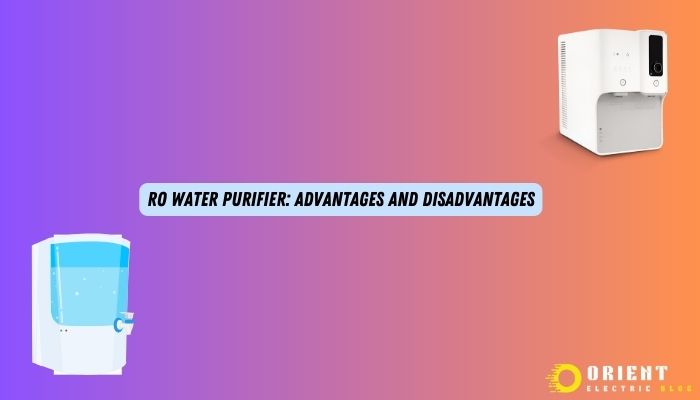Ensuring the availability of safe and clean drinking water is essential for maintaining good health. Unfortunately, our water systems can be susceptible to various contaminants such as chemicals, bacteria, and viruses, posing risks to human well-being.
In such circumstances, Reverse Osmosis (RO) water purifiers have emerged as a common solution. By employing a semi-permeable membrane, RO purifiers effectively eliminate hazardous impurities.
This article aims to provide a comprehensive overview of the pros and cons of RO water purifiers, equipping you with the necessary insights to make an informed decision.

RO Water Purifier Advantages:
Removes pollutants and impurities from water:
- A description of how RO water purifiers remove contaminants and impurities from water
- Examples of typical toxins and impurities that RO water purifiers can remove include lead, arsenic, and chlorine.
Enhances the flavour and odour of water:
- A description of how RO water purifiers can enhance water’s flavour and aroma by removing unfavourable flavours and aromas.
- Examples of typical tastes and scents that RO water purifiers can eliminate include a metallic taste and a sulfur smell.
Dispenses wholesome drinking water:
- A description of how RO water purifiers can provide clean, safe drinking water by eliminating dangerous pollutants and toxins
- Examples of places where RO water purifiers have been employed include developing nations and regions with contaminated groundwater.
Low-cost and low-maintenance:
- Why RO water purifiers might be more affordable and require less maintenance than other water purifiers is discussed.
- RO water purifiers can result in long-term financial savings, including less demand for bottled water and increased appliance longevity.
Friendly to the environment:
- Explains how RO water purifies wastewater throughout the purification process owing to the separation of filtered water from wastewater—examples of how this can have a detrimental influence on the environment and result in higher water costs.
- Here we break down how RO water purifiers stack up against their competitors regarding their potential to be kind to the environment by reducing bottled water consumption and wastewater output.
- Here are a few scenarios where RO water purifiers have helped reduce plastic usage and protect water resources.
Knowing the advantages of RO water purifiers can help determine if they are the best choice for your needs.
RO water purifier Disadvantages:
Wastes a lot of water during the purification process:
- Explains how RO water purifies wastewater throughout the purification process due to filtered water’s separation from sewage.
- Examples of how this can have a detrimental influence on the environment and result in higher water costs.
Removes essential minerals from water:
- Explains how RO water purifiers may eliminate pollutants and toxins from water while also removing vital minerals (such as calcium, magnesium, and potassium)
- Some potential ways this affects water’s taste and nutritional value are given.
Not always appropriate for all sorts of water sources:
- Reasons why RO water purifiers could not work with certain water supplies, such as healthy water with high iron or manganese levels.
- Here are some scenarios where pre-treatment is necessary for RO water purifiers to function correctly.
Electricity is needed for the operation:
- RO water purifiers may not be suitable for use in places with unstable or no electricity supply because they need electricity.
- Several instances of this might pose a problem for rural or remote areas.
You may measure the potential downsides against the benefits and decide whether a RO water purifier is good for you by being aware of the drawbacks of RO water purifiers.
Conclusion:
RO water purifiers remove pollutants from drinking water, making them popular. However, they waste water during purification, remove essential minerals, and require electricity.
Consider your demands before buying a RO water filter. An RO water purifier may be wise if you reside in a low-water-quality location or are concerned about your drinking water. However, there may be better choices than a RO water purifier if you are on a budget or live in an area with unreliable electricity.
Before choosing a RO water purifier, weigh its pros and cons and consider cost, maintenance, and water source suitability.
